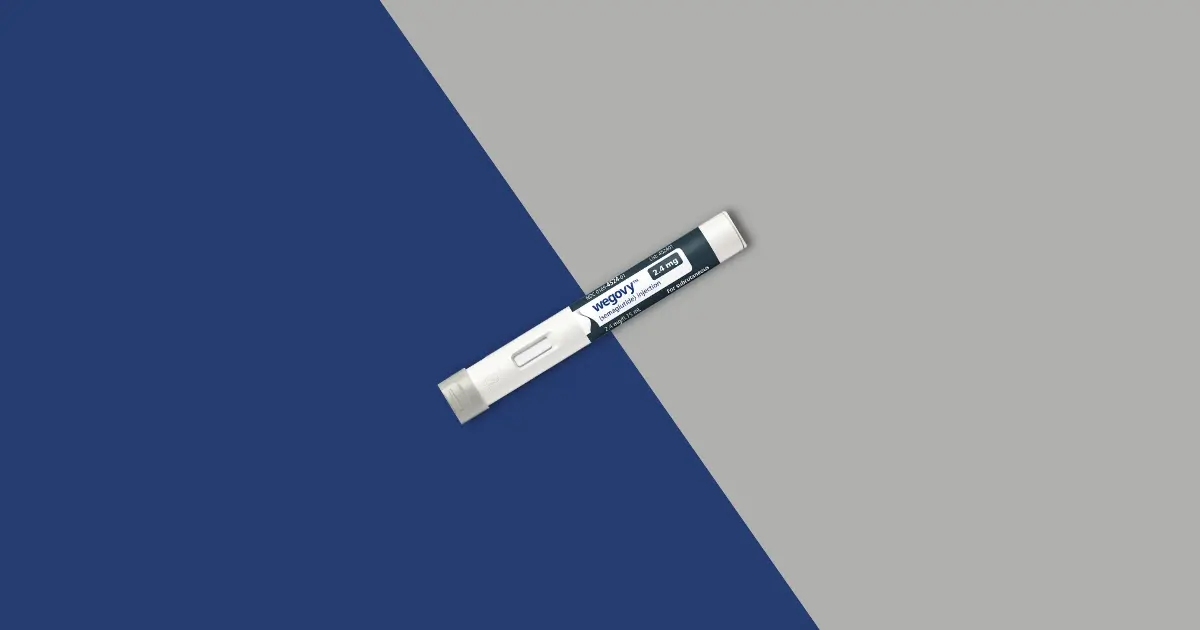9 best alternatives to Wegovy for weight loss
Key highlights
- Wegovy is a GLP-1 (glucagon-like peptide-1 receptor agonist) approved for chronic weight management in people with obesity and overweight. It’s also approved for preventing life-threatening cardiovascular events related to obesity.
- If Wegovy is hard to find or not covered by your insurance, there are alternative FDA-approved injectable medications for weight loss, including Zepbound (tirzepatide) and Saxenda (liraglutide).
- Other oral weight loss medications such as phentermine, Contrave (naltrexone/bupropion), Qsymia (phentermine/topiramate ER), and Xenical (orlistat) are also available.
- Lifestyle changes like diet, physical activity, sleep, and stress management can enhance the effectiveness of weight loss medications.
- Always consult with your healthcare provider to find the safest and most effective prescription medication for you.
Wegovy (semaglutide) is a popular FDA-approved prescription drug for chronic weight management in people with obesity (BMI of 30 or more) and overweight (BMI of 27 or more) with at least one weight related condition. This once-weekly injection works by mimicking a natural gut hormone called glucagon-like peptide-1 (GLP-1) receptor agonists to control hunger and make you feel full longer.
Wegovy, manufactured by Novo Nordisk, is FDA-approved to treat obesity, support long-term weight management, and reduce the risk of heart problems related to obesity.
People may seek alternatives to Wegovy for various reasons, such as limited access, high cost, or side effects. If the medication is too expensive, not covered by insurance, or if you prefer not to use injections, there are other options available.
Keep reading to discover the top 9 alternatives to Wegovy including other medications and natural methods to consider for your weight loss journey.
1. Zepbound
Zepbound (tirzepatide) is a once-weekly FDA (U.S. Food and Drug Administration) approved injectable weight-loss medication. This once-weekly injection works by mimicking two natural gut hormones, GIP and GLP-1. Wegovy and Zepbound are approved for adults, while Wegovy is also approved for adolescents 12 and older.
Tirzepatide, when combined with diet and exercise, can lower blood sugar and help people with diabetes lose weight. It has also been shown to help those without diabetes lose weight.
A study found that over 18 months, people with type 2 diabetes who took 15 mg of tirzepatide (the main ingredient in Zepbound) lost almost 18% of their body weight, compared to 12.4% for those taking 2.4 mg of semaglutide.
In another SURPASS study, people using the active ingredient in Zepbound lost more weight than those using semaglutide, the active ingredient in Wegovy.
Unlike Wegovy, both Mounjaro and Zepbound are GLP-1/GIP agonists, which have proved to promote more weight loss than GLP-1 agonists like Wegovy.
Zepbound has similar side effects to Wegovy, such as nausea, vomiting, diarrhea, and constipation.
Zepbound may lead to more weight loss than Wegovy, and a head to head trial showed that participants taking tirzepatide lost an average of 20.2% of their body weight, while participants taking semaglutide lost 13.7%. However, Wegovy is also approved to reduce the risk of serious heart problems in some people, while Zepbound isn’t approved for this indication yet, although it might be in the future.
Zepbound costs $1,059.87 per month, which is less than Wegovy. Eli Lilly, the drug’s manufacturer, offers a Zepbound Savings Card to help people with commercial insurance save more, even if their insurance doesn’t cover Zepbound.
As of now, all dosage strengths of Zepbound are available, according to the FDA Drug Shortages database. However, patients may still face challenges filling their prescriptions, as the supply can vary between pharmacies.
2. Mounjaro
Mounjaro (tirzepatide) contains the same active ingredient as Zepbound and is prescribed in the same dosage strengths.
Mounjaro is FDA-approved to treat type 2 diabetes. It is a dual GLP-1/GIP agonist, which has been shown to help people lose more weight than GLP-1 agonists like Wegovy as shown in a head-to-head trial conducted by the manufacturer, Eli Lilly.
A study of people with type 2 diabetes found that the highest doses of tirzepatide led to more weight loss than the 2 mg dose of semaglutide (the active ingredient in Wegovy).
Clinical trials of Mounjaro showed people with type 2 diabetes lost up to 13.9% of their body weight over 104 weeks. However, these trials mainly focused on people with diabetes.
Similar to Wegovy, Mounjaro can cause side effects like nausea, diarrhea, vomiting, constipation, and upset stomach.
Healthcare professionals can prescribe Mounjaro for weight loss off-label, but it’s more likely to be covered by insurance if you have type 2 diabetes, although prior authorization may be needed.
3. Ozempic
Ozempic (semaglutide) was first approved by the FDA to help control blood sugar levels in adults with type 2 diabetes and can also lower the risk of heart problems (death, heart attack, or stroke) in people with both diabetes and heart disease, later, researchers found they could help with weight loss. While it’s not officially approved for weight management, many doctors prescribe it off-label.
In clinical trials, people using 2 mg of Ozempic once a week for diabetes lost at least 5% of their body weight over 40 weeks. Some participants lost more than 10% of their initial body weight. Ozempic is typically prescribed in lower doses (0.25 to 2 mg a week) for diabetes, so the weight loss may be less than higher doses of Wegovy (2.4 mg weekly).
Ozempic also has fewer side effects than Wegovy, though it can still cause stomach issues like nausea, vomiting, diarrhea, stomach pain, and constipation.
If you have type 2 diabetes, your insurance may cover Ozempic. If your insurance doesn’t cover it, Ozempic costs around $968.52 per month without a discount card, which is slightly less than Wegovy.
It might be easier to find Ozempic in stock, although it has been in short supply over the past year.
4. Compounded tirzepatide
Compounded tirzepatide is a custom-made version of the same drug used in Mounjaro and Zepbound (tirzepatide).
Compounding pharmacies can create compounded versions of tirzepatide based on a healthcare provider’s prescription. This might be an option if the regular brand name of the drug is unavailable.
However, compounded drugs are not FDA-approved, which means they aren’t subject to the same strict quality controls and regulations as FDA-approved medications. This can raise concerns about the consistency, safety, and effectiveness of the drug.
People considering compounded tirzepatide should seek medical advice from their healthcare provider and discuss the risks and benefits to ensure it’s a safe and suitable option for them.
5. Compounded semaglutide
Compounded semaglutide is a custom-made medication with the same active ingredient found in Wegovy and Ozempic.
Compounded semaglutide is prepared by a compounding pharmacy based on a doctor’s prescription, and it may be used if the brand name drug is unavailable.
If you and your provider decide that compounded tirzepatide is the best option for you, be sure to choose a reputable, licensed compounding pharmacy that requires a prescription.
6. Saxenda
Approved in 2010, Saxenda (liraglutide) was the first GLP-1 medication approved for weight loss in adults with obesity or overweight with at least one weight-related health issue. It is also approved for children aged 12 and older with obesity. It’s made by the same company as Wegovy, Novo Nordisk.
Saxenda, being an older GLP-1 medication, has some downsides compared to newer medications. For example, it’s taken daily instead of weekly, and you might lose less weight with it than other injectable GLP-1 medications. It also doesn’t have the same cardiovascular benefits as Wegovy.
The STEP 8 clinical trial showed that Wegovy (16% average weight loss) helped people lose more weight than Saxenda (6% average weight loss).
Saxenda has the same list price as Wegovy, costing about $1,349.02 without insurance. However, the Saxenda Savings Card offered by Novo Nordisk can bring the cost down to as low as $25 for those with commercial insurance.
Like Wegovy, insurance plans usually won’t cover Saxenda without prior authorization. If you have type 2 diabetes, your insurance provider is more likely to cover Victoza, which contains the same active ingredient as Saxenda, liraglutide.
Like Wegovy and Zepbound, Saxenda is also in short supply, so it may be hard to find a pharmacy that has it in stock.
7. Contrave
Contrave (bupropion/naltrexone) is another weight loss pill that combines two ingredients: bupropion (an antidepressant) and naltrexone (used to block opioid effects). It’s FDA-approved for chronic weight management along with diet and exercise for adults with obesity or overweight with at least one weight-related health condition. Both ingredients work together to reduce hunger and manage cravings.
With diet and exercise, Contrave can help people lose 5 to 10% of their body weight over 56 weeks.
Apart from stomach-related side effects, Contrave can also cause insomnia, trouble sleeping, and high blood pressure.
Contrave could be a good choice for someone who prefers not to use an injection. After the first few weeks of taking Contrave, the usual dosage is 2 pills taken twice a day. Unlike injectable GLP-1 medications, there have been no shortages of Contrave so far.
Without insurance, it costs about $667.84 per month. It’s easier to find in stock, and if your insurance covers it, you’ll likely pay less. If not, coupons and savings programs can help lower the cost.
8. Qsymia
Qsymia (phentermine/topiramate extended-release) is another oral combination pill that works by reducing your appetite used in individuals without certain health conditions like cardiovascular disease, high cholesterol, or uncontrolled hypertension as well as children 12 years and older with obesity.
Qsymia may be more convenient for some people than Contrave because you only need to take one pill every morning.
In clinical trials, most people lost about 8% to 10% of their starting body weight. Qsymia has shown long-term results, with an average weight loss of 9.6 lbs with the low dose and 10.9 lbs with the high dose after 108 weeks of use.
Before switching to Qsymia, you and your healthcare provider should discuss its neuropsychiatric side effects, risks, and interactions. Common side effects include numbness or tingling, constipation, and dry mouth.
Qsymia can cause severe birth defects, so there is a mandatory risk management program. If you can get pregnant, you’ll need to take a pregnancy test before starting and once a month while taking Qsymia. You must also use reliable birth control while on this medication.
Unlike Wegovy, Qsymia is often covered by most health plans, though prior authorization may be needed. It’s also much cheaper, with an average out-of-pocket cost of $211.
There is no shortage of Qsymia right now, so it should be easier to find than Zepbound. However, pharmacies must be FDA-certified to dispense it because of the risk management program.
9. Xenical
Orlistat is another option to consider instead of Wegovy. Xenical is a 120 mg prescription pill, and Alli is a 60 mg pill you can buy over the counter. Neither brand nor generic version of Orlistat is affected by drug shortages right now.
Orlistat works by blocking your body from absorbing some of the fat you eat, which then leaves your body as waste. However, it can cause uncomfortable side effects like fatty stools, flatus with discharge, oily spotting, and more frequent or urgent bowel movements. It’s best to use Orlistat with a low-fat diet to help reduce these side effects.
You’re likely to lose less weight with Orlistat compared to Wegovy. In clinical trials, people taking Xenical lost 5% or more of their body weight after 1 year. To make Xenical effective, you need to take it three times a day with meals that contain fat.
Orlistat is much cheaper than Wegovy and more readily available. Prices range from $55.82 per month for Alli to $803.15 for a 1-month supply of Xenical.
Comparing Wegovy alternatives
Here’s a comparison of the effectiveness, cost, side effects, and accessibility of different Wegovy alternatives:
Comparing Wegovy alternatives
| Medication | Effectiveness | Cost | Side effects | Accessibility |
|---|---|---|---|---|
| Wegovy | High weight loss (up to 15-20%) | $1,430 per month | Nausea, vomiting, diarrhea, constipation | Limited availability due to shortages |
| Ozempic | Moderate weight loss (up to 12-15%) | Lower than Wegovy ($1,029 per month) | Nausea, diarrhea, constipation | Widely available for diabetes but less for weight loss |
| Zepbound | High weight loss (up to 20%) | $1,126 per month | Nausea, vomiting, diarrhea, constipation | Available but may be in short supply |
| Mounjaro | High weight loss (up to 20%) | $1,135 per month | Nausea, vomiting, diarrhea | Available but may be in short supply |
| Saxenda | Moderate weight loss (5-10%) | $1,430 per month | Nausea, headache, dizziness | Available in most pharmacies |
| Qsymia | Moderate weight loss (5-10%) | $211 per month | Insomnia, dry mouth, constipation | Widely accessible, covered by many insurance plans |
| Contrave | Moderate weight loss (5-10%) | $668 per month | Nausea, headache, insomnia | Widely accessible, covered by most insurance plans |
| Compounded Semaglutide | Similar to Wegovy (up to 15-20%) | Lower than Wegovy ($200-300/month) | Nausea, vomiting, diarrhea, constipation | Available at specialized pharmacies, may require a prescription |
| Compounded Tirzepatide | Similar to Zepbound (up to 20%) | Lower than Zepbound ($300-400/month) | Nausea, vomiting, diarrhea, constipation | Available at specialized pharmacies, may require a prescription |
| Orlistat (Alli/Xenical) | Moderate weight loss (3-5%) | Low ($40-100/month) | Gas, oily stools, diarrhea, stomach pain | Widely accessible, available over-the-counter for Alli |
Each medication has its unique benefits depending on your medical condition and personal needs, so it is important to consult with your healthcare provider to determine the best fit for you.
- Affordability: Ozempic and Saxenda are more affordable alternatives to Wegovy.
- Rapid weight loss: Zepbound and Mounjaro offer the fastest weight loss results.
- Diabetes and weight loss: Ozempic and Mounjaro are excellent options for people with type 2 diabetes looking to manage both blood glucose and weight.
Ozempic vs. Wegovy
Ozempic and Wegovy both contain the same active ingredient, semaglutide, but they are used for different purposes and prescribed for different conditions.
- Ozempic is FDA-approved to treat type 2 diabetes. It helps lower blood sugar levels by improving the way the body responds to insulin. Ozempic can also help reduce the risk of heart problems, such as heart attacks and strokes, in people with type 2 diabetes and heart disease.
- Wegovy is FDA-approved for weight loss in adults who are obese or overweight and have at least one related health condition, such as high blood pressure, type 2 diabetes, or sleep apnea.
While both drugs are similar in their active ingredient and how they work, they are prescribed for different health issues; Ozempic for managing blood sugar in diabetes, and Wegovy for helping with weight loss.
Is there an over-the-counter Wegovy?
No, there is no over-the-counter version of Wegovy. Wegovy is a prescription medication, so you need a doctor’s prescription to get it.
Because it can have side effects and must be used under medical supervision, it’s not available without a prescription. If you’re considering weight loss drugs, it’s important to consult your healthcare provider to determine the best and safest options for you, whether that’s Wegovy or another treatment.
Is there a Wegovy shortage?
Yes, there is currently a Wegovy shortage. According to the FDA Drug Shortages database, the active ingredient in Wegovy, semaglutide, is in shortage.
Despite this shortage, all five doses of Wegovy; 0.25 mg, 0.5 mg, 1.0 mg, 1.7 mg, and 2.4 mg are listed as “available,” although it might still be hard to find them at your local pharmacy due to supply issues at various locations.
You might be wondering if the Wegovy shortage also affects Ozempic since both contain the same active ingredient, semaglutide. Although both drugs have had shortages since 2022, all doses of Ozempic are currently available, according to the FDA.
Ozempic is FDA-approved to help control blood sugar in adults with type 2 diabetes, along with diet and exercise. It can also be prescribed to reduce the risk of heart problems like heart attacks and strokes in people with type 2 diabetes and heart disease.
Wegovy is FDA-approved for weight loss in adults and children with obesity, as well as in adults who are overweight and have at least one weight-related health problem (like high blood pressure or diabetes).
If you’re having trouble filling your Wegovy prescription during a shortage, talk to your healthcare provider for guidance.
When will the Wegovy shortage be over?
It’s not clear when the Wegovy shortage will end. Novo Nordisk, the manufacturer, is working to increase production. It’s a challenging task since around 25,000 people start taking Wegovy each week in the U.S.
Lower doses of Wegovy may be harder to find, as the manufacturer was focusing on supplying patients that are already on the medication, while cutting the supply of the starter doses by about 50%.
Because medications like Wegovy are so popular, finding alternatives that aren’t also in short supply might also be difficult. If your pharmacy is out of stock, try calling other pharmacies nearby. If you’re still having trouble, your healthcare provider can help you find the best solution.
Behavioral and psychological alternatives
- Cognitive Behavioral Therapy (CBT): CBT helps you change the thoughts and behaviors that impact eating and weight loss.
- Support groups and coaching programs for accountability: Join a support group or work with a coach to get motivated and stay on track. Being accountable to others will help you reach your weight loss goals.
- Apps and tools for tracking food intake and exercise: Use apps or tools to track what you eat and how much you exercise to stay focused on your goals. Makes it easier to see your progress and where to improve.
How to switch to a Wegovy alternative
If you are considering switching from Wegovy, talk to your healthcare provider about switching to an alternative.
Make sure you understand your insurance coverage benefits as this will impact your ability to continue treatment and reach your weight loss goals.
Remember GLP-1 receptor agonists like Wegovy are in high demand and can sometimes be backordered at pharmacies. Availability is a factor to consider so check with your local pharmacy for availability.
Wegovy and other GLP-1s have been backordered in the past. The manufacturers are working to catch up. Ask your healthcare professional for more information.
Natural alternatives to Wegovy
Successful and long-term weight management should include more than just medication. Natural or non-drug alternatives can be enough to maintain a healthy weight and improve overall health.
Dietary changes
- The Mediterranean diet: Eat whole foods like fruits, vegetables, whole grains, nuts, and healthy fats (olive oil). Good for heart and overall health.
- Plant-based eating: Eating more plants, veg, beans, and whole grains can help with metabolic health and reduce the risk of chronic diseases like diabetes and heart disease.
- Calorie control and macronutrient balance: Controlling calorie intake and balancing macronutrients (proteins, fats, and carbohydrates) helps you manage your weight.
Lifestyle changes
- Regular physical activity: Regular exercise including strength training like weight lifting or bodyweight exercises builds muscle, boosts metabolism, and burns fat. Cardio like running, walking, cycling, or swimming improves heart health and makes your body more insulin sensitive which is good for blood sugar control.
- Stress management: Stress is key to weight loss. High stress can lead to overeating or emotional eating so finding ways to relax like meditation, deep breathing or hobbies can help you stay on track.
- Sleep optimization: Sleep is key to weight management. Poor sleep can affect hunger hormones so aim for 7-9 hours of sleep a night.
Supplements
- Chromium: Chromium helps with blood sugar control and insulin response to support diabetes management and weight loss. Use with caution if you are taking other medications or have other health conditions. Chromium is found in foods like broccoli, green beans, whole grains, turkey, grapes, and tomato juice.
- Berberine: Found in barberry, Phellodendron, Oregon grape, and tree turmeric, works like GLP-1 medications by boosting metabolism and may help with weight loss and waist size. Studies show it improves insulin resistance and blood sugar control, 1.5 grams a day.
- Fiber: Fiber is a natural supplement that helps with digestion and fullness. Adding more fiber to your diet will help you eat less.
Supplements may work for some but not all. Always consult a healthcare professional before using supplements as they may not work for everyone or have potential side effects.
Holistic and integrative approaches
- Acupuncture and traditional practices: Acupuncture and other traditional practices can reduce appetite by stimulating certain points in the body. These can help with relaxation and balance which can support weight loss.
- Mindful eating: Mindful eating and portion control are paying attention to what you eat, savoring each bite, and listening to your body’s hunger cues. This can stop overeating and healthy eating habits.
- Green tea extract: Green tea extract is an herbal remedy that can boost metabolism and fat burning. It has antioxidants called catechins which can help with weight loss when combined with a healthy diet and exercise.
- Garcinia Cambogia: Garcinia Cambogia is a tropical fruit extract used in weight loss supplements. It’s said to reduce appetite and block fat production by blocking an enzyme that turns carbs into fat and increases serotonin levels which can reduce hunger.
- Bitter melon: A fruit that can help lower blood sugar. Has compounds that act like insulin to regulate blood sugar in diabetics. Consult with a healthcare provider before using it as treatment.
- Fenugreek: A plant that can help with digestion and insulin sensitivity. It has fiber that can help digestion and some studies say it can lower blood sugar by improving the body’s response to insulin.
How to maximize weight loss with Wegovy
To get the most out of Wegovy, you need to combine it with healthy eating and exercise. Wegovy, like all weight loss medications, works best with a reduced-calorie diet and increased physical activity.
Focus on nutrient-dense foods and not just eating less (although that helps a lot). Replace processed, fatty, and sugary foods with whole foods and veggies. Try healthy eating habits like mindful eating and portion control to see what works for you.
For exercise, you don’t need to do intense cardio or weightlifting. Yoga, dance, swimming, biking, or walking are great options. You can also add more movement to your day by parking further away or taking the stairs instead of the escalator.
FAQs about Wegovy alternatives
Can I achieve the same results without medication?
While it’s possible to achieve weight loss through healthy lifestyle changes like a balanced diet and regular exercise, medications can be helpful for effective weight loss, especially if you face challenges with weight loss on your own.
What’s the most affordable prescription alternative to Wegovy?
The most affordable prescription alternative to Wegovy is often considered to be Contrave. However, the cost can vary depending on your insurance and location, so it’s recommended to check with your healthcare provider or pharmacy for the best option for you.
How long does it take to see results with natural alternatives?
With natural methods like diet and exercise, it can take a few weeks to start seeing noticeable results, but it varies for each person. Consistency is key, and significant changes may take a few months.
When to consult a doctor
You should consult a doctor if you’re thinking about starting a weight loss medication, experiencing side effects from treatment, struggling with weight loss despite trying healthy habits or if you have health conditions like obesity or diabetes. A doctor can help you choose the best medication and guide you safely through the process.
Bottom line
Wegovy (semaglutide) is a popular weekly injection that is typically in short supply due to high demand but there are other options including injectable GLP-1s and oral weight loss pills.
Injectable options like Zepbound and Saxenda are similar but also in short supply. Oral options like Contrave, Qsymia, and Xenical are more available but don’t promote as much weight loss.
If you’re concerned about the Wegovy shortage, talk to your healthcare provider about your options and if other medications could work for you.
All medications have different risks, side effects, and results. Talk to your healthcare provider before making any changes to your medication to ensure the best and safest option for your health.










